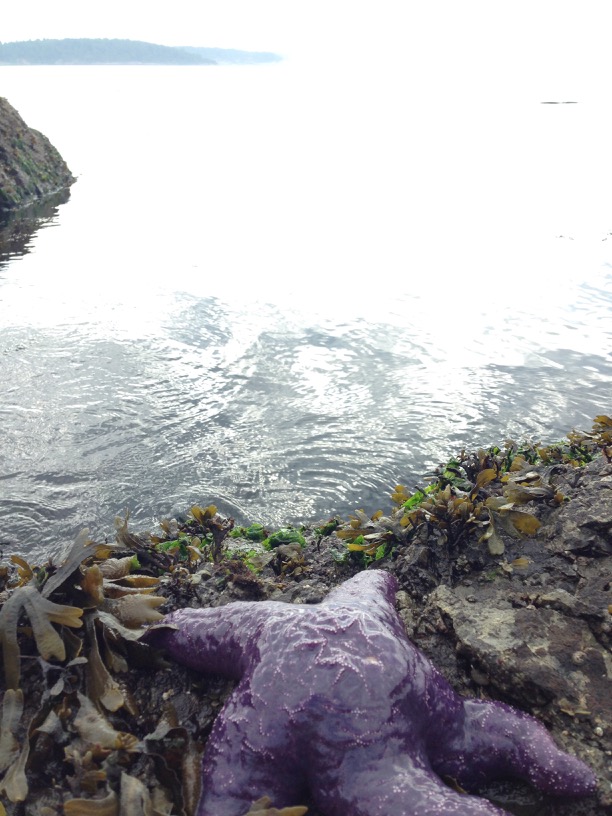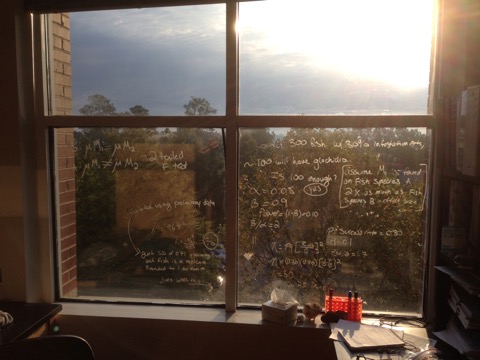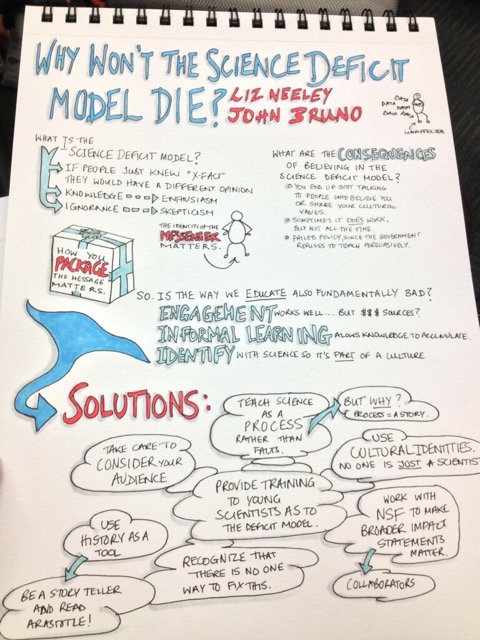teaching
Teaching
06/09/17 09:17
It has been a busy summer. Doesn't feel like I had much time away from the office. I'm currently inundated with teaching duties - it isn't going badly, but it is taking all the energy I have to keep it from going badly. The goal of this course is a survey of why we study organismal biology, for students who are not majoring in biology. So we just spent the past few weeks learning about how organisms are intimately and physiologically tied to their environment (and introduced the problem of climate change as an opportunity to test this idea with surveys to compare with historical distributions and forecasts for the coming decades). Next up is the whole of biodiversity itself.
I was also able to finally publish Katelyn's paper in PeerJ. It came out really nicely thanks to the help of one kind peer reviewer in particular; I think I was emphasizing some of the wrong points in the first version of the manuscript and now it really makes it clear that the EF1A mutants (those carrying one copy of the mutant allele) are physiologically distinct beasts. Should be a lot of interesting work to be done following that up!
Otherwise, like you all, I'm overwhelmed. Too much to do, anxiety about doing it well, anxiety for how so many are being affected by terrible weather and yes, terrible politics. What a year.
I was also able to finally publish Katelyn's paper in PeerJ. It came out really nicely thanks to the help of one kind peer reviewer in particular; I think I was emphasizing some of the wrong points in the first version of the manuscript and now it really makes it clear that the EF1A mutants (those carrying one copy of the mutant allele) are physiologically distinct beasts. Should be a lot of interesting work to be done following that up!
Otherwise, like you all, I'm overwhelmed. Too much to do, anxiety about doing it well, anxiety for how so many are being affected by terrible weather and yes, terrible politics. What a year.
Friday Harbor
12/05/16 12:47
Done teaching for the spring. Whew.
For the first time, however, I'm actually teaching in the summer. I've done a Maymester course with Jim Hamrick for OTS, but generally I use the summer for research, travel, R&R, writing proposals. This year I'm delighted to be an instructor at Friday Harbor marine lab, one of the most amazing places in the world to be a biologist and interact with other amazing biologists.
One of the few downsides, however, is that to do research there - the exact projects we have proposed - means getting our act together ahead of time, knowing exactly what we need and when we need it. A lot of equipment and supplies are already at FHL, but that doesn't mean they are laying dormant waiting for us. Cooperating with the whole crew at Friday Harbor is, of course, part of the experience of getting research done close to the field (unless you are lucky enough to live there!).
So, this month is a good time for me to be in the lab. All the undergrads are gone, and as it turns out after 20 years I'm pretty good at rocking out a PCR here, a gel there, organizing equipment and supplies, and thinking of how amazing it will be when I'm there.
For the first time, however, I'm actually teaching in the summer. I've done a Maymester course with Jim Hamrick for OTS, but generally I use the summer for research, travel, R&R, writing proposals. This year I'm delighted to be an instructor at Friday Harbor marine lab, one of the most amazing places in the world to be a biologist and interact with other amazing biologists.
One of the few downsides, however, is that to do research there - the exact projects we have proposed - means getting our act together ahead of time, knowing exactly what we need and when we need it. A lot of equipment and supplies are already at FHL, but that doesn't mean they are laying dormant waiting for us. Cooperating with the whole crew at Friday Harbor is, of course, part of the experience of getting research done close to the field (unless you are lucky enough to live there!).
So, this month is a good time for me to be in the lab. All the undergrads are gone, and as it turns out after 20 years I'm pretty good at rocking out a PCR here, a gel there, organizing equipment and supplies, and thinking of how amazing it will be when I'm there.

Less is More
28/10/13 11:51

Everybody in the Genetics Department gets effectively the same 1000 sq ft lab to start with. They are functional but charmless - that is, they are functional if you are cloning and doing a lot of bench-top science. For bioinformatics, animal rearing, etc. the labs are less well planned, and if you actually want to talk to people in the lab without ducking under and around the shelving it gets awkward. So my renovations, maintaining all the potential for using the lab benches as they have traditionally been used but opening space up for our computational environment, have begun. We are capping all the water/gas/vacuum on this bench, having new outlets installed, and eliminating the sinks. Everybody is excited about it, and I think it will do a lot for the overall feel and ethos of the lab. We don’t do traditional bench-top genetics. I figure I’ll be in this lab for another 20 years, perhaps, so I may as well like it.
 (wrong picture somehow ended up here previously)
(wrong picture somehow ended up here previously)I am adding this update a couple weeks later because it is the same basic topic. I love that my lab is not merely/primarily a place of getting things done, but a place of learning and interaction. Inspired by what I’ve heard of the Santa Fe Institute, I encouraged my folks a few years back to use their windows to best advantage. We play music, we stop to talk about ideas, we have a constant supply of scrap paper to explain something to another colleague or student. That’s the way it is supposed to be. I can’t take any individual science project going on in my lab too seriously: they are barnacles, they are mussels, and so on. But the overall pursuit of understanding is a pretty beautiful thing some days.
Explanations
01/02/13 09:36
I saw this post from John Bruno (from the Science Online meeting) yesterday and had to share it. There is no reason we should still be having the same discussions over and over and over and over and over. It is clear that just spouting data at people does not work to educate them; as educators, and communicators, we have to figure out better how to resonate with people.


Wiki This
30/08/12 09:05
I’m always surprised that there are people who read this lab website blog. You really surely have better things to do with your time! But if you’re here, I’m going to point you to another website that you may find interesting. This semester I’m teaching Honors Evolution, a one-hour class each week that complements the big lecture class. The big class has 200 students, making personal interactions and discussions very difficult; the small class has 14, and I’m using it to experiment with how wikis can allow students to organize what they learn and even push the direction of a course to suit their interests.
Basically, the topic of the Honors course is how evolution intersects with climate change in marine populations. Will it ameliorate the effects of climate change by allowing populations to adapt to a shifting environment? Will only some species be able to adapt? Nobody really knows for sure, and there still hasn’t been much done on this topic in the literature. But my students’ job is to surf this literature and discuss it, synthesizing what they find on the wiki. This means that they work together, their grade is essentially based on participation and interaction, and at the end we might actually have an interesting, useful resource for learning more about evolution and climate change.
Anyway, this is all explained better on the site itself. It is a wiki, but only members of the class can contribute, so it is not an open community like Wikipedia. Nevertheless if you find it interesting there are places to comment, and I’m hoping this will be a fun thing to do this semester.
Basically, the topic of the Honors course is how evolution intersects with climate change in marine populations. Will it ameliorate the effects of climate change by allowing populations to adapt to a shifting environment? Will only some species be able to adapt? Nobody really knows for sure, and there still hasn’t been much done on this topic in the literature. But my students’ job is to surf this literature and discuss it, synthesizing what they find on the wiki. This means that they work together, their grade is essentially based on participation and interaction, and at the end we might actually have an interesting, useful resource for learning more about evolution and climate change.
Anyway, this is all explained better on the site itself. It is a wiki, but only members of the class can contribute, so it is not an open community like Wikipedia. Nevertheless if you find it interesting there are places to comment, and I’m hoping this will be a fun thing to do this semester.
Teaching
30/09/11 13:09
I’ve just about finished my first stand as lecturer in our Intro Evolution course at UGA, a class that started with 197 students... I think it is safe to say there are fewer now after the first exam. I have one lecture to give and am really grateful to the students as they put up with me figuring out the dynamics of a class that size, I’m only now getting more comfortable with singling people out so I get answers to my questions that are more audible than a group mumble. Yesterday I said, “You, Duke shirt” to get a response from a woman wearing a Duke football jersey. I mean, if you don’t want to get called on in class you have to wear something more inconspicuous than the football jersey for a school that barely plays football :)
Our labs genome data are slowly coming in; all of the Illumina data for Serratia are back, and Ron Eytan is busily figuring out how to assemble the bacterial genomes. The Georgia Genomics Facility is having some technical difficulties with the 454 sequencer, so that project has been slowed down considerably. And hopefully soon the data will be back for the work in Chile, which - now that I think about it, I leave for Chile in less than 3 weeks, so having those data would be nice!
Our labs genome data are slowly coming in; all of the Illumina data for Serratia are back, and Ron Eytan is busily figuring out how to assemble the bacterial genomes. The Georgia Genomics Facility is having some technical difficulties with the 454 sequencer, so that project has been slowed down considerably. And hopefully soon the data will be back for the work in Chile, which - now that I think about it, I leave for Chile in less than 3 weeks, so having those data would be nice!